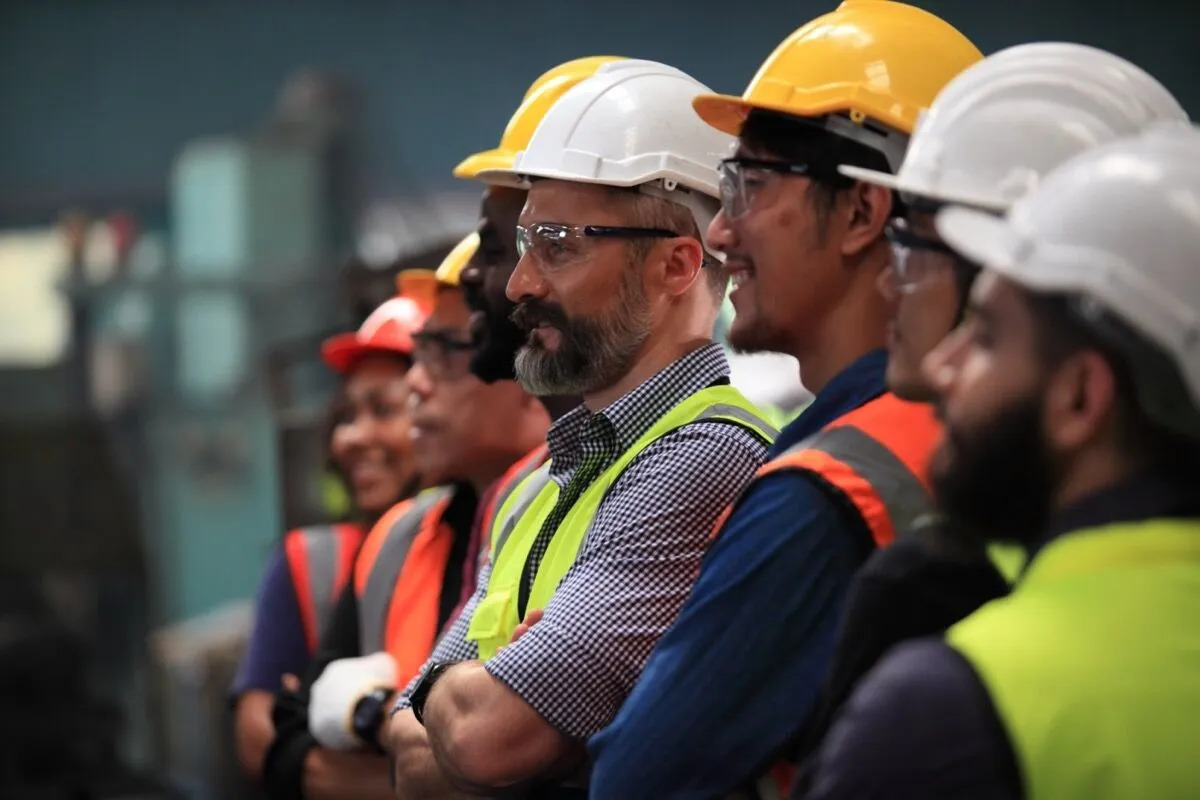Home>diy>Building & Construction>How Much Do Construction Workers Get Paid Per Hour


Building & Construction
How Much Do Construction Workers Get Paid Per Hour
Modified: January 4, 2024
Discover how much building construction workers get paid per hour and learn about the average wages in the industry. Stay informed and make informed career choices!
(Many of the links in this article redirect to a specific reviewed product. Your purchase of these products through affiliate links helps to generate commission for Storables.com, at no extra cost. Learn more)
Introduction
Construction workers are the backbone of the building industry, responsible for the physical labor and technical skills required to construct buildings and infrastructure. These dedicated individuals work tirelessly to bring architectural plans to life, ensuring that structures are built safely and efficiently. However, one question that often arises is – how much do construction workers get paid per hour?
The hourly pay for construction workers can vary significantly depending on various factors. These factors include experience level, location, job specialization, and the type of project they are working on. In this article, we will delve into the factors that affect construction worker hourly pay, explore the average hourly pay rates, discuss regional variations, and shed light on additional benefits and compensation packages available to construction workers.
Understanding the various factors that contribute to construction worker hourly pay is essential for both workers and employers. It allows workers to negotiate fair compensation and helps employers determine the appropriate wages to attract and retain skilled workers.
Key Takeaways:
- Construction worker hourly pay varies based on experience, specialization, location, and industry demand. Understanding these factors is crucial for fair compensation and attracting skilled workers to the industry.
- Additional benefits such as health insurance, retirement plans, and paid time off contribute to construction workers’ well-being and job satisfaction. Fair and competitive pay rates are essential for a thriving construction workforce.
Read more: How Much Is Landscaping Per Hour
Factors Affecting Construction Worker Hourly Pay
Several factors influence the hourly pay rate for construction workers. Understanding these factors can provide insight into why pay rates may vary across different individuals and projects. Here are some key factors:
- Experience Level: Construction workers with more experience tend to earn higher hourly wages. Years of practical knowledge and expertise result in increased efficiency and productivity on the job.
- Job Specialization: Certain specialized roles within the construction industry, such as electricians, plumbers, or crane operators, often command higher hourly rates due to the specialized skill sets required for these positions.
- Location: Construction worker hourly pay can vary significantly from one geographic location to another. Cost of living, demand for labor, and local market conditions play a significant role in determining wages.
- Industry Demand: Construction industries experiencing high demand will generally offer higher hourly rates to attract and retain skilled workers. Moreover, industries experiencing labor shortages may increase wages to incentivize workers to join their projects.
- Union Membership: Unionized construction workers often enjoy higher hourly pay rates and additional benefits. Collective bargaining agreements negotiated by unions aim to ensure fair wages and safe working conditions for their members.
- Education and Certifications: Higher education levels and relevant certifications can lead to increased hourly pay. Construction workers with specialized training or certifications are more likely to be hired for specific roles and may earn higher wages as a result.
These factors interact and influence each other, creating a dynamic environment for determining construction worker hourly pay. Employers take these factors into account when setting wages, and workers can use this knowledge to negotiate fair compensation for their skills and expertise.
Average Hourly Pay for Construction Workers
The average hourly pay for construction workers can vary depending on the specific job role and location. However, there are some general trends that provide insights into the industry’s compensation practices.
According to the U.S. Bureau of Labor Statistics, as of May 2021, the median hourly wage for construction laborers was $18.80 per hour. This figure represents the midpoint, meaning that half of the workers earned less than this amount, while the other half earned more.
However, it’s important to note that specific job roles within the construction industry may have different average hourly pay rates. For example, occupations such as electricians, plumbers, and carpenters often command higher wages due to their specialized skills and training. The median hourly wage for electricians, for instance, was $27.11 per hour in May 2021.
Additionally, factors such as experience and location can also impact the average hourly pay. Construction workers with several years of experience are typically able to command higher wages, while those just starting in the industry may earn lower rates. Similarly, construction workers in cities with a higher cost of living, such as New York or San Francisco, may earn higher wages compared to those in rural areas.
It’s essential to note that these figures are averages and can vary significantly depending on the specific circumstances. It’s always advisable to research the prevailing wage rates for the specific job role and location to better understand the expected hourly pay.
Furthermore, it’s worth keeping in mind that hourly rates do not include additional benefits and compensation that construction workers may receive. These benefits can include health insurance, retirement plans, paid leave, and overtime pay, among others. The total compensation package should be taken into account when evaluating the attractiveness of a construction worker’s pay.
Understanding the average hourly pay for construction workers provides a baseline for both workers and employers to gauge fair compensation. It serves as a starting point for negotiations and can help ensure that workers are adequately compensated for their skills and contributions to the construction industry.
Regional Variations in Construction Worker Hourly Pay
Construction worker hourly pay rates can vary significantly based on the geographic location. Several factors contribute to these regional variations in wages, including cost of living, local supply and demand, and prevailing market conditions. Here are some key points to consider:
High-Cost Areas: In cities or regions with a high cost of living, construction worker wages tend to be higher to match the increased expenses. Metropolitan areas such as New York City, San Francisco, or Washington D.C. typically have higher hourly pay rates compared to rural or less expensive areas.
Demand and Market Conditions: Areas experiencing a boom in construction activity often have higher demand for skilled workers. Increased demand, coupled with labor shortages, can drive up construction worker wages. Conversely, areas with a slower pace of construction may have lower hourly rates due to decreased demand.
Unionized vs. Non-Unionized: Regional variations can also be influenced by the presence of unions. In areas with strong union representation, construction workers often enjoy higher wages and better benefits due to collective bargaining agreements. Unionized workers may have more consistent pay rates across different regions.
Local Regulations and Prevailing Wage Laws: Some regions have regulations in place that enforce prevailing wage rates for construction projects funded by the government. These laws ensure that construction workers are paid fair wages that align with the local standard in the area. As a result, construction worker hourly pay rates in areas with prevailing wage laws may be higher than in regions without such regulations.
Economic Factors: The overall economic health of a region can also impact construction worker wages. Strong economic growth and investment in infrastructure projects can lead to higher demand and increased pay rates. On the other hand, economic downturns or recessions may result in lower wages as construction activity slows down.
It’s crucial for construction workers and employers to consider regional variations when determining fair compensation. Workers should research wage trends and cost of living in their specific location to ensure they are being paid competitively. Similarly, employers should take into account local market conditions and prevailing wage rates when setting hourly pay for construction workers.
By acknowledging and understanding the regional variations in construction worker hourly pay, stakeholders in the industry can ensure fair compensation and promote a healthy and sustainable construction workforce in each specific area.
Research the average hourly wage for construction workers in your area to ensure you are being fairly compensated. Factors such as experience, location, and specific trade can also impact pay rates.
Additional Benefits and Compensation for Construction Workers
Construction workers often receive additional benefits and compensation in addition to their hourly wages. These benefits are designed to attract and retain skilled workers, promote job satisfaction, and ensure their overall well-being. Here are some common additional benefits and compensation practices in the construction industry:
- Health Insurance: Many construction companies provide health insurance coverage for their workers. This can include medical, dental, and vision insurance, giving workers access to necessary healthcare services and helping to protect them and their families.
- Retirement Plans: Construction workers may have access to retirement plans such as 401(k) or pension plans. These plans allow workers to save for their future and ensure financial stability after their working years are over.
- Paid Time Off: Construction companies often provide paid time off for vacations, holidays, and sick days. This allows workers to take necessary breaks and recharge, promoting work-life balance and overall well-being.
- Overtime Pay: In many cases, construction workers are eligible for overtime pay when they work more than the standard 40 hours a week. Overtime rates are typically higher than the regular hourly wage and provide additional compensation for the extra hours worked.
- Bonuses and Incentives: Some construction companies offer bonuses or performance-based incentives to reward workers for exceptional performance or meeting specific targets. These additional payments serve as a motivation for workers to go above and beyond in their work.
- Training and Education: Construction companies may invest in training and educational programs for their workers. This can involve providing opportunities for skill development, certifications, or specialized training that enhance workers’ capabilities and improve their earning potential.
- Safety Equipment and Gear: Employers are responsible for providing necessary safety equipment and gear to ensure the well-being of construction workers. This includes items such as hard hats, safety goggles, gloves, and protective clothing.
These additional benefits and compensation packages contribute to the overall job satisfaction and financial stability of construction workers. They demonstrate employers’ commitment to the well-being and success of their workforce, fostering a positive work environment and encouraging employee loyalty.
It’s important for construction workers to carefully review the benefits and compensation package offered by potential employers to understand the full value of their employment. Employers, on the other hand, should strive to provide competitive benefits and compensation packages that attract and retain skilled workers in a highly competitive industry.
Unionized Construction Workers and Hourly Pay
Unionized construction workers enjoy certain benefits and protections that can affect their hourly pay rates. Labor unions represent the collective voice of workers in negotiations with employers, aiming to secure fair wages, improved working conditions, and other benefits. Here are some key points to understand about unionized construction workers and their hourly pay:
Collective Bargaining Agreements: Labor unions negotiate collective bargaining agreements (CBAs) with employers on behalf of their members. These agreements outline the terms and conditions of employment, including wages, working hours, benefits, and other provisions. CBAs often result in higher hourly wages for unionized construction workers compared to non-unionized workers in the same role and region.
Minimum Wage Standards: Labor unions advocate for higher minimum wage standards, not just for their members but also for the entire construction industry. By establishing minimum wage standards, unions help ensure that all workers, unionized or not, receive fair compensation for their work.
Wage Scales and Pay Progression: Union contracts often include wage scales that outline different pay levels based on factors such as experience, skills, and job classification. These scales provide a fair and structured approach to pay progression, allowing workers to earn higher wages as they gain experience and expertise in their field.
Cost-of-Living Adjustments (COLAs): In some union contracts, there may be provisions for cost-of-living adjustments (COLAs). COLAs are periodic wage increases that are tied to the inflation rate or changes in the cost of living. These adjustments help unionized construction workers keep pace with rising living expenses and maintain their standard of living.
Benefits and Job Security: Unionized construction workers often have access to comprehensive benefit packages, including health insurance, retirement plans, and paid time off. These benefits not only contribute to overall compensation but also provide financial security and peace of mind for workers and their families. Moreover, labor unions advocate for job security, protecting workers from unfair terminations and providing avenues for grievance resolution.
Training and Skill Development: Unions play an active role in promoting training and skill development programs for their members. By investing in the training and education of construction workers, unions increase their members’ abilities and marketability, which can lead to higher hourly pay rates.
It’s important to note that joining a labor union is a personal choice for construction workers. Unionized workers pay union dues and abide by the rules and regulations set by the union. In return, they benefit from the collective strength and representation that unions provide.
Unionized construction workers have historically played a vital role in improving working conditions and raising wage standards for the industry as a whole. Their collective action and advocacy help ensure fair compensation and a better quality of life for construction workers throughout various regions.
Factors That Impact Construction Worker Pay Increases
Construction worker pay increases can be influenced by several factors. These factors can vary depending on the overall economic conditions, industry trends, and individual circumstances. Here are some key factors that impact construction worker pay increases:
Economic Growth: A strong economy with increased construction activity can create demand for skilled workers. When the demand for construction workers exceeds the available supply, employers may need to offer higher wages to attract and retain workers. Economic growth and a robust construction industry often lead to pay increases for construction workers.
Experience and Skill Level: Construction workers with extensive experience and specialized skills are in high demand. As workers gain more experience and develop their expertise, they become more valuable to employers. Consequently, they may negotiate higher pay rates or receive pay increases as a recognition of their advanced skills and productivity.
Industry Demand and Labor Shortages: Construction industries experiencing labor shortages may need to increase wages to entice workers to join their projects. Industries with high demand for specialized skills, such as electrical or plumbing, often offer higher pay rates to attract workers who possess those skills. Additionally, industries experiencing a surge in construction projects may increase wages to compete for available workers.
Industry and Market Trends: Pay increases in the construction industry can be influenced by market trends and changes in the industry. Factors such as new technologies, changes in building regulations, or shifts in project requirements may impact the demand for specific skills, leading to increased pay rates for workers with those skills.
Cost of Living and Geographic Location: Construction worker pay can vary based on the cost of living in different regions. Areas with a higher cost of living may offer higher wages to ensure that workers can afford the expenses associated with the region. Similarly, construction workers in areas with a high demand for construction, such as major cities, may command higher pay rates due to increased competition and living costs.
Union Negotiations: Labor unions play a significant role in advocating for fair compensation and improved working conditions for construction workers. Through collective bargaining, unions negotiate with employers to secure higher wages and better benefits for their members. Union negotiations and contracts can lead to pay increases for unionized construction workers.
Inflation and Cost-of-Living Adjustments: Inflation can erode the purchasing power of wages over time. To account for rising living expenses, some pay structures include cost-of-living adjustments (COLAs) tied to inflation rates. These adjustments ensure that workers’ wages keep pace with the increasing cost of goods and services, helping to maintain their standard of living.
Company Policies and Performance: Pay increases may also be influenced by company policies and performance evaluations. Some companies have structured performance review systems that determine pay raises based on an employee’s performance and achievements. Outstanding performance, meeting or exceeding targets, or taking on additional responsibilities can contribute to higher pay increases.
It’s crucial for construction workers to stay informed about industry trends, market conditions, and their own skills to position themselves for potential pay increases. Employers should consider the factors impacting construction worker pay and ensure that their compensation policies are competitive to attract and retain skilled workers.
Conclusion
The hourly pay for construction workers is influenced by various factors, including experience level, job specialization, location, industry demand, and union representation. Understanding these factors is essential for both workers and employers to ensure fair compensation and attract skilled individuals to the construction industry.
While average hourly pay rates can provide a baseline, it’s important to consider regional variations and additional benefits in evaluating the overall compensation package. High-cost areas, strong market demand, and unionized work environments often result in higher hourly wages for construction workers. Moreover, additional benefits such as health insurance, retirement plans, paid time off, and safety equipment contribute to workers’ well-being and job satisfaction.
Factors that impact construction worker pay increases include economic growth, experience and skill level, industry demand, market trends, geographic location, union negotiations, inflation, and company policies. Understanding these factors allows workers to position themselves for potential pay increases and enables employers to develop competitive compensation policies.
Ultimately, fair and competitive hourly pay rates are essential for attracting and retaining skilled construction workers who play a vital role in the building industry. By recognizing the expertise, hard work, and dedication of construction workers, we can create a sustainable and thriving construction workforce.
In conclusion, while answering the question of how much construction workers get paid per hour, it’s crucial to consider the multitude of factors influencing their pay rates. By addressing fair compensation, providing additional benefits, and considering the complexities of the construction industry, we create an environment that values and rewards the essential work performed by construction workers.
Frequently Asked Questions about How Much Do Construction Workers Get Paid Per Hour
Was this page helpful?
At Storables.com, we guarantee accurate and reliable information. Our content, validated by Expert Board Contributors, is crafted following stringent Editorial Policies. We're committed to providing you with well-researched, expert-backed insights for all your informational needs.















0 thoughts on “How Much Do Construction Workers Get Paid Per Hour”